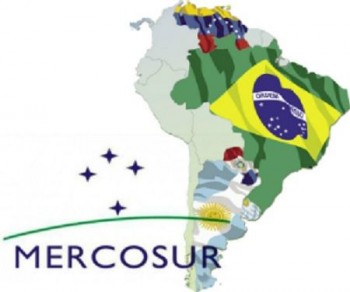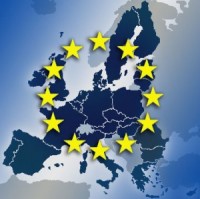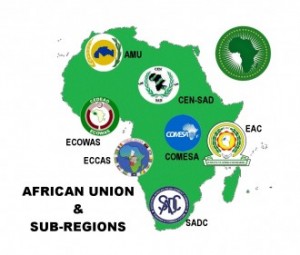Tariffs and regional blocs
U.S. TARIFFS PROMPT NATIONS TO INTENSIFY REGIONAL INTEGRATION
President Donald Trump’s pursuit of bilateral trade agreements with individual nations is a positive step away from the multilateral “free trade” of chaotic, open-border globalism.
But the Trump tariff policy would have been much more effective decades ago, before any of today’s regional trade blocs, led by the European Union, were able to gain a footing and develop, largely through US taxpayer funding in the name of “free trade.”
As the strongest of these regional blocs, the EU has now developed to the point of political integration, commanding its own Trump trade agreement. European integration, the prototype of incremental globalism aspired by all other regional blocs, has also received a great amount of US funding, starting during the time of the Marshall Plan, and on through the nurturing of Europe’s economic integration in the 1950s.
Even until today, the EU has continued to receive covert foreign aid, largely through steep tariffs charged on US products without reciprocation by the US. This has remained the policy through every US administration, until Trump announced reciprocal tariffs in this ongoing tariff war that was started by the EU, and many nations, decades ago.
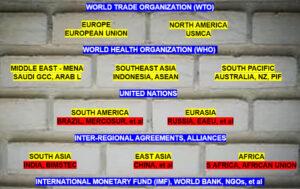
Vladimir Putin: “These are the integration bricks….”
HOWEVER, THE FOLLOWING NEWS SUMMARY OF WORLD HEADLINES indicates that Trump’s reciprocal tariffs are counterintuitively prompting many nations to intensify efforts to integrate into their respective regional blocs, which globalists have been developing for decades around the world.
Faced with reduced revenue through the US market, these nations are opting to pursue removal of tariff and non-tariff barriers within their respective regional blocs, thus expanding intra-regional trade and regional infrastructure with fellow region-member nations. In addition, inter-regional trade agreements among regions promise to provide trade revenue apart from nations’ bilateral agreements with the US.
Tim Porter, CircumspectNews.com – August 18, 2025
Newer headlines similar to the following will be added to this news summary:
Trump tariffs will forge regional blocs, warns Japanese trading house
Nikkei Asia, Aug 1, 2025 – U.S.President Donald Trump’s tariffs will create regional trading blocs and realign global supply chains, the CEO of Japanese trading house Marubeni has warned.
Marubeni CEO Masayuki Omoto spoke with Nikkei Asia in Tokyo on July 28.
Vietnam PM targets Mercosur, GCC pacts to counter US duties
MalayMail, Sep 24, 2025 – Exports “will face difficulties and challenges… due to strategic competition, conflicts and the US’s ‘reciprocal’ tariff policies,” Prime Minister Pham Minh Chinh said in a statement posted on the government’s website today….
To offset the impact of the US duties, Vietnam aims to sign free trade agreements with Latin America’s Mercosur trading bloc and Gulf Cooperation Council countries by the end of the year, Chinh said.
EU moves ahead with Mercosur trade deal, pending member states’ approval
PUSH TO OPEN NEW MARKETS IN FACE OF US TARIFFS
Le Monde|AFP, Sep 3, 2025 – The European Commission gave final approval Wednesday to a vast trade deal with South America’s Mercosur bloc, insisting it carries ‘robust safeguards’ for farmers.
The agreement to form a 700-million-customer free-trade area, the world’s biggest, is a key pillar in Brussels’ push to open new markets in the face of United States tariffs. But it has faced Paris-led opposition over agricultural concerns.
China, ASEAN, and GCC outline regional cooperation plan
GLOBAL-TRADE SHIFT TO REGIONAL NETWORKS
TV BRICS, May 30, 2025 – Analysts believe that this emerging trilateral structure reflects a broader trend in global trade: a shift from global supply chains to more geographically concentrated and sustainable regional networks.
How Trump’s Tariffs on India and Brazil Could Strengthen BRICS
RealClearWorld, Aug 19, 2025 – Both India and Brazil are facing 50% duties that have little to do with trade imbalances. For India, the tariffs are retaliation for its Russian oil imports, while for Brazil the levies come in response to the prosecution of Trump’s ally, former President Jair Bolsonaro. Trump has also threatened additional tariffs on India and Brazil due to their participation in BRICS, which the president accuses of being “anti-American.”….
Neither India nor Brazil appears willing to accede to Trump’s demands, setting up a dynamic that could strengthen BRICS’ cohesion, push India closer to Russia and China, and undercut U.S. influence in the Indo-Pacific. In short, Trump’s attempt to coerce India and Brazil could accelerate the very geopolitical realignment Washington fears.
UN Commission urges Latin America to diversify markets to confront Trump’s tariffs
CALLS FOR DEEPENING REGIONAL INTEGRATION IN LATIN AMERICA
Reuters, Aug 15, 2025 – The head of the U.N. commission on Latin America, Jose Manuel Salazar, urged the region’s countries to diversify their export and import markets and to integrate their economies in response to U.S. President Donald Trump’s tariffs….
He also called for exploring trade and investment channels with Asian and African countries, and for deepening regional integration in Latin America.
Trump’s tariffs could help accelerate IMEC’s implementation
COULD RESHAPE REGIONAL SUPPLY CHAINS, BOOST INFRASTRUCTURE
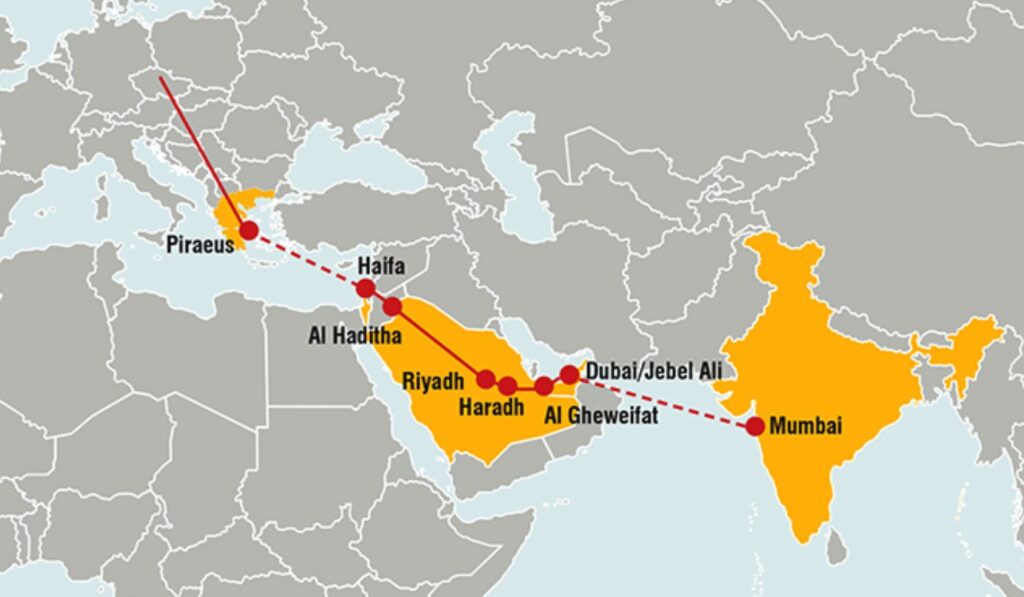
Hindustan Times, Aug 15, 2025 – The IMEC project is ambitious, aiming to forge a faster, more efficient trade route that connects South Asia with Europe via the Middle East…. By consolidating longitudinal trade and energy links, it could potentially reshape regional supply chains, boost infrastructure investments, and establish new entry points into European markets for Asian and Middle Eastern goods.
Trump’s tariffs have, therefore, introduced a sense of urgency to these discussions. Several trade analysts argue that the new trade barriers could push India to diversify its export markets, lessening its reliance on the increasingly protectionist US….
Similarly, the European Union (EU)’s own experience with US trade tensions has reinforced its need to strengthen independent supply chains.
SEE: AN OPEN QUESTION: OPEN BORDERS IN THE MIDDLE EAST? – CircumspectNews, Jan 6, 2024
The unintended consequence of Trump’s tariffs is pushing BRICS together
PROMPTS BRICS NATIONS TO CIRCLE WAGONS, PRESENT UNITED FRONT
bne IntelliNews, Aug 13, 2025 – President Donald Trump’s tariff salvo aimed at some of the BRICS economies is in danger badly of backfiring on US interests by driving the more moderate members of the world’s leading emerging economies into the anti-Western Sino-Russian alliance.
The US president’s Liberation Day assault on all of America’s main trading partners has prompted the BRICS to circle their wagons and present a united front in the face of US protectionism, when previously there was little true unity amongst them.
Trump tariffs bring impetus to expanded intra-ASEAN trade: Malaysia
Philippine News Ageny, Aug 19, 2025 – The sweeping global tariffs imposed by the Trump administration should provide fresh impetus to boost trade within the Association of Southeast Asian Nations (ASEAN), Malaysia’s envoy to Manila said on Tuesday….
Castelino said Malaysia, by the end of its ASEAN chairmanship, hopes to see the ASEAN Power Grid (APG) get finalized, among other agreements. The APG is an initiative seeking to connect the 10 bloc members’ electricity networks and boost energy-related trade within the ASEAN….
ASEAN stands as the world’s fifth-largest economy at USD3.8 trillion, and is projected to become the fourth-largest by 2030.
A New Age of Empire? Trump, Trade Wars and Global Fragmentation
TRUMP’S TARIFFS RESHAPING WORLD INTO FRAGMENTED BLOCS
The Wire, April 14, 2025 – Trump’s second term represents both the symptom and the cause of a structural crisis in global capitalism. His aggressive tariffs, retreat from multilateralism and oligarchic consolidation are reshaping the world economy into fragmented blocs, undermining the liberal global order.
Globalization in the Age of Trump
MUCH OF WORLD HAS STRENGTHENED COOPERATION WITH REGIONAL ORGANIZATIONS
China-US Focus, Aug 1, 2025 – Faced with challenges posed by the Trump administration, much of the world has strengthened regional cooperation. In the Asia-Pacific, the signing of the Regional Comprehensive Economic Partnership — one of largest and most important free trade agreements ever to come along — is expected to promote regional trade liberalization and investment facilitation and strengthen cooperation on regional industrial and supply chains. Meanwhile, the EU has worked to strengthen internal integration, thus fortifying its single market and enhancing its competitiveness in the global economy. The UK, though no longer a member of the EU, is pursuing closer cooperation with countries on the continent. In Africa, the African Continental Free Trade Area is helping to promote trade and economic integration across the continent.
Beyond tariffs: The new era of managed trade
REGIONAL TRADE BLOCS ARE STRENGTHENING
Philstar Global (Philippines), April 8, 2025 – Instead of broad multilateral trade frameworks involving many countries, there seems to be a shift toward country-specific trade terms. This, in turn, appears to be encouraging regionalization over globalization – regional trade blocs are strengthening as global integration faces headwinds.
The rise of Regionalism in World Politics: Trends and Implications
SUPPLY CHAINS ARE REALIGNING AROUND REGIONAL STRENGTH
TRUMP’S NATIONALISM AMPLIFYING SHIFT FROM GLOBALISM TO REGIONALISM
Modern Diplomacy, May 7, 2025 – As global institutions are clinging to life and multilateralism appears to be not as effective as it was, the regional blocs are experiencing a significant rise in their strength and influence, on the contrary. The return of US President Donald and his nationalist policies and priority for domestic interests over global cooperation has amplified this shift further and ushered in a renewed emphasis on regionalism. The world is now witnessing a growing trend where countries are turning to regional partnerships to secure their political, socio-economic, and strategic interests. Various regions from Europe to Asia, Latin America to Africa, and the Middle East are responding by bolstering intra-regional cooperation….Although this development presents fresh chances for group resilience, it also necessitates cautious handling to keep regionalism from turning into a cause of conflict and instability.
Trump tariffs cement ‘new multipolar global economy’
COUNTRIES TURNING TO REGIONAL BLOCS TO SECURE POLITICAL, SOCIO-ECONOMIC, STRATEGIC INTERESTS
Financial Mirror (Cyprus), Aug 1, 2025 – “Multipolarity now defines the direction of global trade,” said Nigel Green, CEO of deVere Group, one of the world’s largest independent financial advisory and asset management organisations….
“Tariffs are being baked in as permanent features of the new economic order. Countries are responding by building systems that can operate without US permission.”….
“This fragmentation is the new baseline. The post-war consensus on trade and financial cooperation is fading. What replaces it is a world of multiple economic power and influence centres, each with their own rules and reach.”
IMF chief: Countries must ‘make the best’ of new multipolar world
ACCELERATE REGIONALIZATION
AFP | France 24, April 17, 2025 – Countries have no choice but to “make the best” of the fragmentation of the global economy by boosting ties with regional and like-minded countries, the head of the International Monetary Fund said in an interview Thursday.
Yes, (it’s) much better for the world to get one system of rules, much better, and hopefully we will retain the basic principles of this common system for the future,” IMF Managing Director Kristalina Georgieva told AFP.
“But we are in a multipolar world,” she said….
“And in this environment, it is likely to continue, maybe even accelerate, so we will see more bilateral and plurilateral agreements,” she said, pointing to places like southeast and central Asia, and Gulf Cooperation Council (GCC) countries.
UN Commission urges Latin America to diversify markets to confront Trump’s tariffs
CALLS FOR DEEPENING REGIONAL INTEGRATION IN LATIN AMERICA
Reuters, Aug 15, 2025 – The head of the U.N. commission on Latin America, Jose Manuel Salazar, urged the region’s countries to diversify their export and import markets and to integrate their economies in response to U.S. President Donald Trump’s tariffs….
He also called for exploring trade and investment channels with Asian and African countries, and for deepening regional integration in Latin America.
Trump’s Tariff Gambit
DRIVING COUNTRIES TOWARD REGIONAL BLOCS
Counterpunch, April 17, 2025 – His focus will not be on structural reform or meaningful trade rebalancing but on political messaging, painting himself as the only one willing to confront the “China threat.” This approach, however, will only further destabilize the rules-based trading system that the United States helped build, driving more countries toward hedging strategies and regional blocs.
‘Unified Asean should have dealt with US’
‘PRUDENT FOR REGIONAL BLOCS TO ADOPT A UNIFIED STANCE’ TO TRUMP TARIFFS
BusinessMirror (Philippines), July 31, 2025 – In a paper, Philippine Institute for Development Studies (PIDS) Emeritus Research Fellow Josef T. Yap and Senior Research Fellow Francis Mark A. Quimba said Asean countries missed an opportunity to leverage regional interests against high tariffs before they negotiated with the United States….
“It would have been prudent for regional blocs to adopt a unified stance. For example, Asean could have advocated for respect for WTO rules without having to flag the dubious configuration of the TTP [Trump Tariff Plan],” Yap and Quimba said.
“This could have given cover for its member countries when they negotiated with the US. Instead, Indonesia, Viet Nam and the Philippines carried out negotiations without any imprimatur from Asean, leaving them with an inferior position vis-à-vis the US,” they added.
How Trump is bringing Europe together again
New York Times, July 21, 2025 – The president has slapped higher tariffs on European goods, and this month, he threatened to impose a new 30 percent across-the-board levy that European officials warned would hobble trans-Atlantic trade.
Mr. Trump has also demanded that Europe do more to pay for its own defense, and has suggested that the United States would not come to the aid of countries that he felt were not contributing enough to their own security.
All of that has pushed Europe further from America — and closer together.
MEP: Trump, Putin ‘the new founding fathers of the European Union’
Trump tariffs prompt Southern Africa to boost regional cooperation
“SADC MUST UNIFY TO NEGOTIATE COLLECTIVELY, AVOIDING WEAK BILATERAL DEALS”
GIS Reports, June 10, 2025 – The Southern African Development Community (SADC), a regional economic community of 16 member states, initially responded with shock to the White House’s far-reaching tariffs….
The U.S. tariffs highlight the challenges small, poorer nations such as Lesotho face in bilateral trade negotiations with global powers like the U.S. Engaging through multilateral platforms like the SADC is critical for these countries to secure favorable trade outcomes.The SADC must adopt a regional approach to the evolving trade regime rather than relying on individual bilateral strategies.
ASEAN, China, and GCC cooperation will boost global stability and growth: Experts

RESPONSE TO RECENT U.S. TARIFF POLICY
MSN | Xinhua (China), May 24, 2025 – Cooperation between the Association of Southeast Asian Nations (ASEAN), China and the Gulf Cooperation Council (GCC) countries will unlock immense potential for multilateral cooperation across sectors and inject stability into the world economy, analysts said ahead of an inaugural joint summit for the three parties….
Julia Roknifard, a senior lecturer at Taylor’s University in Malaysia, said China is an anchor for ASEAN-GCC cooperation…. The expert called the trilateral cooperation platform a “Golden Triangle” of resources, manufacturing and consumers, which will continue to power the global economy despite severe trade disruptions due to recent U.S. tariff policy.
Global Non-West And Multipolarity
LINKED BRICS, REGIONAL BLOCS CAN BECOME CATALYST FOR MULTIPOLARITY AGAINST ‘WESTERN HEGEMONY’
Geopolitica.ru, (Russia), May 5, 2025 – Anti-colonialism, strengthening sovereignty, technological development and honest international cooperation are the main criteria of the BRICS club…. There are also separate regional structures, such as ASEAN and SAARC in Southeast and South Asia, the African Union(AU) in Africa, the League of Arab States (The Arab League) in the Middle East, CELAC, UNASUR and ALBA in Latin America, and the Eurasian Economic Union in the former Soviet Union. There is also the supra-regional Organization of Islamic Cooperation…. The creation of new links between all these structures can become an additional catalyst in the formation of multipolarity and reducing the influence of Western hegemony….
ASEAN should expand to counter Trump’s tariffs
ENLARGEMENT WOULD GIVE ASEAN INITIATIVE TO ASSERT ITSELF ON GLOBAL STAGE
DEEPEN ECONOMIC INTEGRATION WITHIN BLOC, COMMERCIAL LINKS WITH GCC, OTHERS
Taipei Times, April 20, 2025 – ASEAN chair, Malaysian Prime Minister Anwar Ibrahim, could still marshal the full power of the bloc to present a unified front and develop policy initiatives to help shield members from the economic disruption caused by Trump’s tariffs. This would be consistent with Anwar’s efforts as ASEAN chair to deepen economic integration within the bloc and forge closer commercial links with the Gulf Cooperation Council and other Asian economies….Here, ASEAN could take a page out of the EU’s playbook, despite not pursuing the same goal of an “ever closer union”; expansion as a way to enhance stability along its borders.
ASEAN must work fast on EU trade deal, says Anwar
IN LIGHT OF SWEEPING TARIFFS BY US
FMT (Malaysia), April 18, 2025 – Prime Minister Anwar Ibrahim says the European Union is looking to work fast on a free trade agreement with Asean in light of the sweeping tariffs announced by the US earlier this month.
US Tariff to Speed Up Indonesia-Eurasia Trade Pact, Russia Says

Jakarta Globe, April 14, 2025 – Indonesia has been wanting to seal a free trade agreement (FTA) with the Russia-led Eurasian Economic Union (EAEU) as it searches for untapped export destinations. At the same time, Southeast Asia’s largest economy — like many countries around the world — is dealing with US President Donald Trump’s reciprocal tariffs.
Trump exempts Russia from the tariff salvo as Western sanctions from the Russo-Ukraine war have stripped Moscow from having meaningful trade with Washington. The EAEU club brings together Russia and four post-Soviet states: Armenia, Kazakhstan, Kyrgyzstan and Belarus.
Singapore PM calls for zero tariffs in ASEAN to take on Trump’s trade duties: ‘We are better resourced’
‘STRONGER ECONOMIC INTEGRATION AMONG ASEAN COUNTRIES IS ESSENTIAL’
Hindustan Times, April 17, 2025 – Amid escalating Donald Trump tariff threats and rising trade tensions, Singapore Prime Minister Lawrence Wong on Wednesday said stronger economic integration among ASEAN countries is essential, emphasising the need to address tariff barriers and enhance trade cooperation within the region.
“We should aim for 100% tariff elimination across the region and boost intra-ASEAN trade. We should further reduce non-tariff barriers to make it easier for businesses to operate across ASEAN….”
Speaking at the S Rajaratnam Lecture, Wong also called for accelerating the development of the ASEAN Power Grid.
African officials urge concerted efforts to foster continental development amid global uncertainities
AU COMMISSION CHAIR: STRENGTHEN AU INSTITUTIONS TO SPEED AFRICA’S INTEGRATION
Xinhua (China), April 17, 2025 – This came as African foreign ministers, the African Union (AU) Commission leadership, and officials of various AU organs convened the 24th Extraordinary Session of the AU Executive Council Tuesday at the AU headquarters in Addis Ababa, the capital of Ethiopia.
Addressing the opening session, AU Commission Chairperson Mahmoud Ali Youssouf…. called for the strengthening of the AU and its institutions to speed up Africa’s integration and development.
Navigating the chaos: How GCC’s trade war survival plan could take shape
‘DEEPER REGIONAL INTEGRATION WILL BE ESSENTIAL’
Arab News, April 11, 2025 – The Gulf bloc must fast-track diversification, strengthen regional integration and deepen global ties in Asia, Africa and Latin America to cushion against the long-term impact of newly imposed US tariffs, a top risk strategist has told Arab News.
“Strategic patience, economic flexibility and deeper regional integration will be essential to navigating what lies ahead,” [Mohammad Fheili] said.
“A more connected and cooperative Gulf economic bloc could serve as a buffer against global headwinds,” said Fheili, adding: “The time is ripe to turn the GCC from a strategic alliance into a true economic force.”
Asean chief urges ‘boldly’ integrating region’s economies amid US tariff worries
SEEKS ‘URGENT AND COLLECTIVE ACTION’ TO ACCELERATE REGIONAL ECONOMIC INTEGRATION
Inquirer.net (Philippines), April 10, 2025 – Asean must “act boldly” to accelerate regional economic integration as sweeping US tariffs leave much of the world caught in the middle of a devastating trade war, the bloc’s chief said Wednesday.
The 10-member Association of Southeast Asian Nations, which count on the United States as their main export market, were among those slapped with the toughest levies by President Donald Trump.
“Without urgent and collective action to accelerate intra-Asean economic integration and diversify our markets and partnerships, we risk ceding our place in a fractured and fast-evolving global economy,” Kao said.
America’s 10% Tariff: Africa’s Golden Opportunity
U.S. RISKS PUSHING ITS TRADE PARTNERS TOWARD RIVAL ECONOMIC BLOCS
Joy Online (Ghana), April 5, 2025 – Africa has a unique opportunity to strengthen its economic integration through the AfCFTA [African Continental Free Trade Area]. Launched in 2021, AfCFTA is the largest free trade area by the number of participating countries, aiming to boost intra-African trade, industrialization, and economic self-sufficiency….
As the U.S. turns inward, the AfCFTA can step up to fill the void, integrate Africa’s economies, and position the continent as the next global manufacturing and trade hub.
Tariffs: ‘Three Goals That Trump Wants To Achieve’
‘MIGHT INADVERTENTLY ACCELERATE REGIONALIZATION … DIVISION OF WORLD INTO COLLECTION OF TRADE BLOCS’
COULD STILL IMPLEMENT ‘FORTRESS AMERICA’ POLICY
Pressenza International Press Agency, April 3, 2025 – Trump’s decision to tariff the entire world to varying extents as revenge for their tariffs against the US has shaken the global economy to its core. Instead of restoring free and fair trade like he claims to want, which would give American companies an advantage, he might inadvertently accelerate regionalization trends and the subsequent division of the world into a collection of trade blocs.
Even if Trump’s global trade war unintentionally turbocharges regionalization trends and the subsequent division of the world into a collection of trade blocs instead of serving as the unprecedented power play that he expects, the US could still take advantage of this to implement its “Fortress America” policy.
U.S. may impose regional tariffs as trade deadlines loom, Bessent says
BESSENT: ‘WE WILL DO A LOT OF REGIONAL DEALS’
Axios, May 18, 2025 – The U.S. may impose some tariffs by region rather than on individual countries, as time runs out to negotiate a laundry list of trade deals globally, Treasury Secretary Scott Bessent said Sunday.
The administration is quickly curtailing its 90-deals-in-90-days ambition, acknowledging the practical realities of trying to negotiate complex trade agreements with dozens of countries simultaneously….
“My other sense is that we will do a lot of regional deals — this is the rate for Central America, this is the rate for this part of Africa — but what we are focused on for right now is the 18 important trading relationships,” Bessent said.
Mexico has proposed matching US tariffs on China, Bessent says
‘WE COULD HAVE FORTRESS NORTH AMERICA’ FROM CHINESE IMPORTS

“COMMON EXTERNAL TARIFFS” IS LEVEL 2 (USMCA IS LEVEL 1)
Reuters, Feb 28, 2025 – U.S. Treasury Secretary Scott Bessent said on Friday that Mexico has proposed matching U.S. tariffs on China in a move that he described as “very interesting” and one that Canada should match.
“I think it would be a nice gesture if the Canadians did it also so in a way we could have fortress North America from the flood of Chinese imports that’s coming out of the most unbalanced economy in the history of modern times,” Bessent said in an interview with Bloomberg TV.




